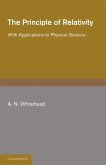The common cause principle says that every correlation is either due to a direct causal effect linking the correlated entities or is brought about by a third factor, a so-called common cause. The principle is of central importance in the philosophy of science, especially in causal explanation, causal modeling and in the foundations of quantum physics. Written for philosophers of science, physicists and statisticians, this book contributes to the debate over the validity of the common cause principle, by proving results that bring to the surface the nature of explanation by common causes. It provides a technical and mathematically rigorous examination of the notion of common cause, providing an analysis not only in terms of classical probability measure spaces, which is typical in the available literature, but in quantum probability theory as well. The authors provide numerous open problems to further the debate and encourage future research in this field.
Hinweis: Dieser Artikel kann nur an eine deutsche Lieferadresse ausgeliefert werden.
Hinweis: Dieser Artikel kann nur an eine deutsche Lieferadresse ausgeliefert werden.
'I would encourage many readers to approach this book. It is clear and, as far as possible, concise. It doesn't neglect any important aspect of the state-of-the-art concerning the Principle. I would recommend this reading to any physicist and particularly to those interested in complex systems and statistical physics. ... I think the book might also interest scholars in the field of philosophy of science. It should also be considered for acquisition by academic libraries, since it deals with a relatively new subject which could be applied in different fields. This book might also constitute a good discussion basis for interesting seminars for future PhDs and would represent a good text book for post-graduate students.' Marco Casazza, Contemporary Physics








